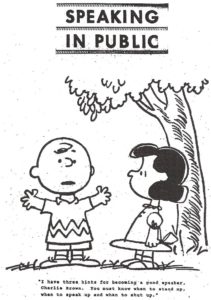I’m a “word nerd”, a term coined by Lindsay Bealko (a fellow word nerd).
Being a word nerd means you value and practice word nerdery (a term I totally just made up).
It’s true that word nerdery is part art, part science. Some will say it’s a talent and, therefore, can’t be learned. This chaps my hide. So not true. I absolutely take umbrage with this. It’s a cop out.
I believe–and this is based on observing a whole bunch of rabble rousing, do gooder types over the years tap into their inner word nerds right before my very eyes–it’s a skill that can be learned. Like knitting or parkours, you have to want to learn it.
This is good news for those us on a mission to change the world. Words can have a HUGE impact on the extent to which you are able to attract, engage, and retain support for your cause. Important, right?
For those of you interested in the world of word nerdery, here’s a tidbit to chew on from our friends at Georgetown University’s Brain and Language Lab:
“Our research focuses on two basic language capacities: the “mental lexicon” (mental dictionary) of memorized words, and “mental grammar” , which underlies the rule-governed sequential and hierarchical combination of lexicon forms into complex words (e.g. walk + ed), phrases and sentences (e.g. Clemential excoriated the pachyderm).”
Whoa, whoa, whoa, what does that mean and what does it have to do with making the world a better place?
Translation: knowing a bunch of words (having a big mental dictionary) doesn’t a word nerd make. It’s our ability to take those words and package them up effectively (i.e. artfully apply mental grammar) that leads to world-changing word nerd awesomeness.
Don’t believe me? Watch this. Then try to tell me with a straight face (and not on April Fool’s Day ) that you don’t want to be able to have that effect with your words.
 I’ll skip the part where I ask if public speaking scares the bejeezus out of you. If you’re like most of the rest of the people on the planet, the answer is yes.
I’ll skip the part where I ask if public speaking scares the bejeezus out of you. If you’re like most of the rest of the people on the planet, the answer is yes.